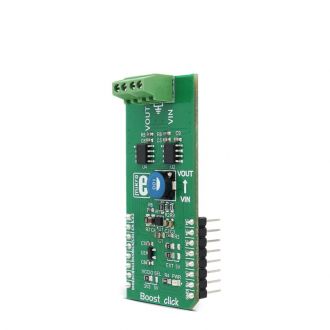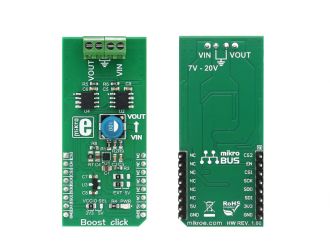
We strongly encourage users to use Package manager for sharing their code on Libstock website, because it boosts your efficiency and leaves the end user with no room for error. [more info]

Rating:
Author: MIKROE
Last Updated: 2019-01-09
Package Version: 1.0.0.1
mikroSDK Library: 1.0.0.0
Category: Boost
Downloaded: 6485 times
Not followed.
License: MIT license
Boost click carries Microchip’s MIC2606, a 2MHz, PWM DC/DC boost switching regulator available in a 2mm x 2mm MLF package. The input voltage can be set to 5V from mikroBUS or in range 7-20V from an external DC source connected to VIN screw terminal. The output voltage can be set up to 38V.
Do you want to subscribe in order to receive notifications regarding "Boost click" changes.
Do you want to unsubscribe in order to stop receiving notifications regarding "Boost click" changes.
Do you want to report abuse regarding "Boost click".


Library Description
The library covers all the necessary functions to control Boost Click board.
Boost click communicates with the target board via SPI protocol.
This library contains drivers for writing DAC value to the MCP4921 chip and reading ADC value from MCP3551 chip,
set configuration, function for setting desired voltage on output and function to getting output voltage.
Key functions:
void boost_setConfiguration( uint8_t pwrSrc ) - Set configuration function.float boost_getVoltage()- Get output voltage function.void boost_setVoltage( uint16_t value ) - Set desired voltage on output function.Examples description
The application is composed of three sections :
- System Initialization - Initializes GPIO, SPI and LOG structures,
sets AN, CS and RST pins as output.
- Application Initialization - Initialization driver enable's - SPI,
set configuration and start write log.
- Application Task - (code snippet) This is a example which demonstrates the use of Boost Click board.
Boost Click communicates with register via SPI by read from MCP3551 chip and write DAC value to the MCP4921 chip.
This example periodicaly increases and decreases voltage in range between 15 and 30 Volts.
All data logs write on usb uart for aproximetly every 5 sec.
void applicationTask()
{
mikrobus_logWrite( " Setting voltage to 15000 mV, _LOG_LINE );
mikrobus_logWrite( "-----------------------------", _LOG_LINE );
boost_setVoltage( 15000 );
Delay_ms( 5000 );
mikrobus_logWrite( " Setting voltage to 30000 mV", _LOG_LINE );
mikrobus_logWrite( "-----------------------------", _LOG_LINE );
boost_setVoltage( 30000 );
Delay_ms( 5000 );
}
Other mikroE Libraries used in the example:
SPIUARTAdditional notes and information
Depending on the development board you are using, you may need USB UART click, USB UART 2 click or RS232 click to connect to your PC, for development systems with no UART to USB interface available on the board. The terminal available in all MikroElektronika compilers, or any other terminal application of your choice, can be used to read the message.